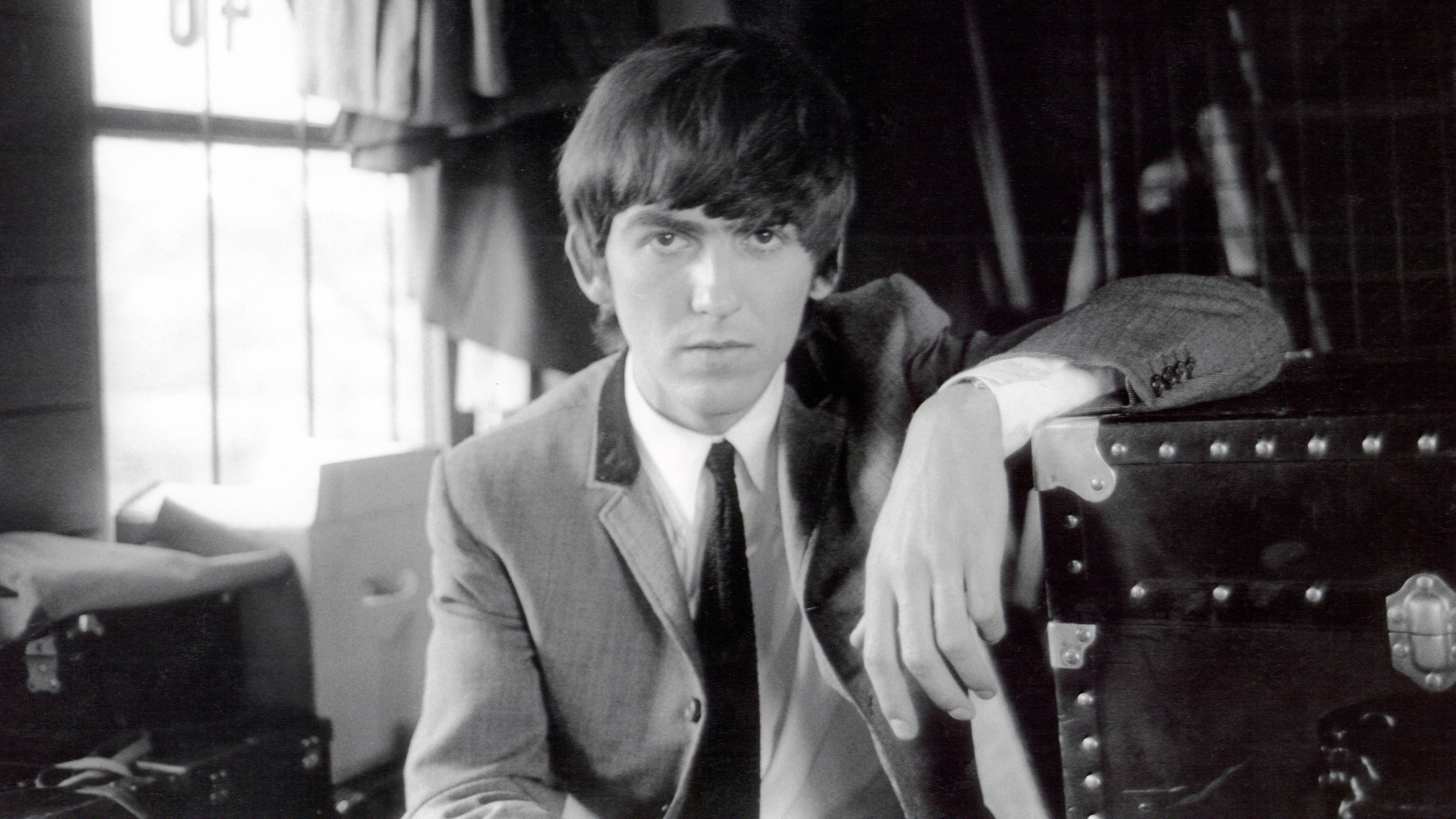
Yes, of course, George Harrison was "the quiet Beatle," in as much as anybody in that seismic quartet could have really been regarded as such.
While the tag might have been one of perspective - John and Paul were the frontmen with outsized personalities, and Ringo, well, he was Ringo! - it was, in fact, the furthest thing from the truth when looking at the impact that George Harrison, that lovely lad with the beautifully sculpted face and impossibly cool hair who also played some pretty darn fine guitar, had on this world.
No, one really couldn't be "quiet" to garner the attention of the then-teenaged John Lennon and Paul McCartney with his version of Raunchy, an audition of which gained his entree into a combo that would become The Beatles.
Years later, when The Beatles were the biggest things since the invention of the wheel, it was Harrison who first put forth the notion that the group end touring - by which time the enigmatic guitarist, already searching to "the answer," had also introduced his bandmates to new sounds and ideals, many of them coming from India.
He would eventually blossom into a songwriting equal to his onetime mentors (some would say he surpassed them on Abbey Road), and soon after The Beatles were finished, he scored a number one with a triple album (All Things Must Pass) and pioneered the charity rock event with his Madison Square Garden shows for Bangledesh.
Never one to showboat his instrumental chops (with the exception of his Raunchy audition), Harrison is one of rock's most captivating and influential guitarists, the embodiment of the "team player" who still found a way to make his every solo a memorable song within a song.
Rockabilly, jazz, blues and surf guitar all came together in George Harrison's early years with The Beatles, but before long he digested his influences and was his own man, dishing out licks, riffs and solos that defy easy categorization.
Get the MusicRadar Newsletter
Want all the hottest music and gear news, reviews, deals, features and more, direct to your inbox? Sign up here.
In the relative shadows, Harrison was perfecting his songwriting, and while one could easily be discouraged when confronted by the likes of Lennon and McCartney, George kept at it. And it's safe to say he did pretty well.
Here, on what would have been his birthday, MusicRadar celebrates the music of George Harrison with a look at what we consider to be his 10 greatest Beatles compositions.
1. Don't Bother Me (1963)
Although Harrison regarded the moody, sullen piece as "a fairly crappy song" (he wrote it while ill in a hotel room) it's still a stark change-up from the eternally upbeat "I'll-be-true-to-you" sentiments of the first Lennon/McCartney compositions. Ringo's drumming has a distinctive Latin feel, and George's guitar playing - the chords roll in from the word go - references both Link Wray and Dick Dale.
2. I Need You (1965)
In his own way, Harrison was advancing as quickly as his elders. I Need You features the same briskly strummed acoustics that Lennon was already favoring (the two were both enamored of Dylan), but George's deft use of a volume pedal on his lead guitar gave his first real love song true ache.
3. Taxman (1966)
Political commentary was still fresh ground for pop music in 1966, and it was especially mind-blowing coming from George Harrison on the first track of The Beatles' eagerly awaited new album. Taxman was Harrison handing it back to The Man, at that time the British Labour government of Harold Wilson. And though there's considerable humor in George's lyrics, his bite is most cutting. A rocking tune by any stretch, it features a king-sized guitar solo by Paul McCartney (reprised at the end).
4. I Want To Tell You (1966)
Revolver was a virtual George-fest, with three of his compositions (Taxman, Love You To and this one) receiving prime-time airing. Beginning with a fade-in, I Want To Tell You is a jaunty affair but one driven by a discordant piano line. During the ending fade, McCartney uses a melisma while chanting "I've got time," an affectionate nod to Harrison's Indian influences.
5. Within You Without You (1967)
Although he had sprinkled sitar, tabla and tambura on a couple of previous Beatles cuts, Harrison's sole writing contribution to Sgt. Pepper's Lonely Hearts Club Band was his Indian music coming-out party, and it was a glorious, David Lean-like panorama. Knowing that he was dealing with heavy stuff, Harrison placed laughter at the end of the track to lighten the mood and continue with the spirit of Pepper.
6. It's All Too Much (1967)
Released on the Yellow Submarine soundtrack of 1969, It's All Too Much was recorded just prior to the the release of Sgt. Pepper. At times the song seems to drift away with Harrison's dreamy verses, but just as quickly it's chopping down trees with explosive percussion and thunderous handclaps. Wild guitar breaks by both Harrison and John Lennon help to make It's All Too Much a dizzying treat.
7. While My Guitar Gently Weeps (1968)
Inspired by reading the I Ching, Harrison wrote what is arguably his first masterpiece as a way of relating the Eastern concept that "there's no such thing as coincidence - every little item that's going down has a purpose." Mournful yet joyous, epic in its sweep, it's a stand-out on a sprawling set full of them - the "White Album."
Harrison was dissatisfied with a backwards guitar solo he had laid down, so he convinced his good friend Eric Clapton to turn in an uncredited guest shot. And Clapton's guitar does indeed cry - but it sings, screams and swoons, too.
8. Old Brown Shoe (1969)
An infectious, lively track that tumbles out of the gate (check out Ringo's raucous drumming) and gallops off. Harrison wrote the song on piano but handed the syncopated keyboard part to McCartney to play in the studio. When it came to bass duties, however, Harrison took over.
"That was me going nuts," he said of his performance. "I'm doing exactly what I do on the guitar." Lennon and McCartney provide backing vocals, but instrumentally Old Brown Shoe is practically all-George: after recording a blazing guitar solo (fed through a Leslie cabinet), he erased Lennon's rhythm guitar and overdubbed a Hammond organ.
9. Something (1969)
When performing Something, Frank Sinatra would often say that it was one of the best love songs ever written and that it was his favorite Lennon-McCartney composition. Well, at least he got it half right. Harrison wrote his breathtaking ballad with Ray Charles in mind as the singer, and for the title he borrowed a line from a James Taylor song, Something In The Way She Moves.
Using these bits of inspiration, he created a piece of work that stands shoulder to shoulder with The Beatles' main songwriters. His exquisite guitar solo was nailed in one take - while a full string section played with him.
10. Here Comes The Sun (1969)
When you're on a roll, you just keep rolling - as Harrison did on Abbey Road, turning in not one but two classics (he also lent songwriting help to Starr on Octopus's Garden).
Penned in Eric Clapton's garden during a much-needed break from the growing tensions in The Beatles, Here Comes The Sun is a full-on celebration, loaded with handclaps, Starr's around-the-kit drum fills, tasteful use of Moog synthesizer and rousing strings.
George's acoustic is capoed at the 7th fret, which normally would result in a key of A minor, but the track is varispeeded slightly, raising the pitch by less than a semitone. Every moment of this song is a holiday.
Joe is a freelance journalist who has, over the past few decades, interviewed hundreds of guitarists for Guitar World, Guitar Player, MusicRadar and Classic Rock. He is also a former editor of Guitar World, contributing writer for Guitar Aficionado and VP of A&R for Island Records. He’s an enthusiastic guitarist, but he’s nowhere near the likes of the people he interviews. Surprisingly, his skills are more suited to the drums. If you need a drummer for your Beatles tribute band, look him up.
"Reggae is more freeform than the blues. But more important, reggae is for everyone": Bob Marley and the Wailers' Catch a Fire, track-by-track
“Part of a beautiful American tradition”: A music theory expert explains the country roots of Beyoncé’s Texas Hold ‘Em, and why it also owes a debt to the blues










